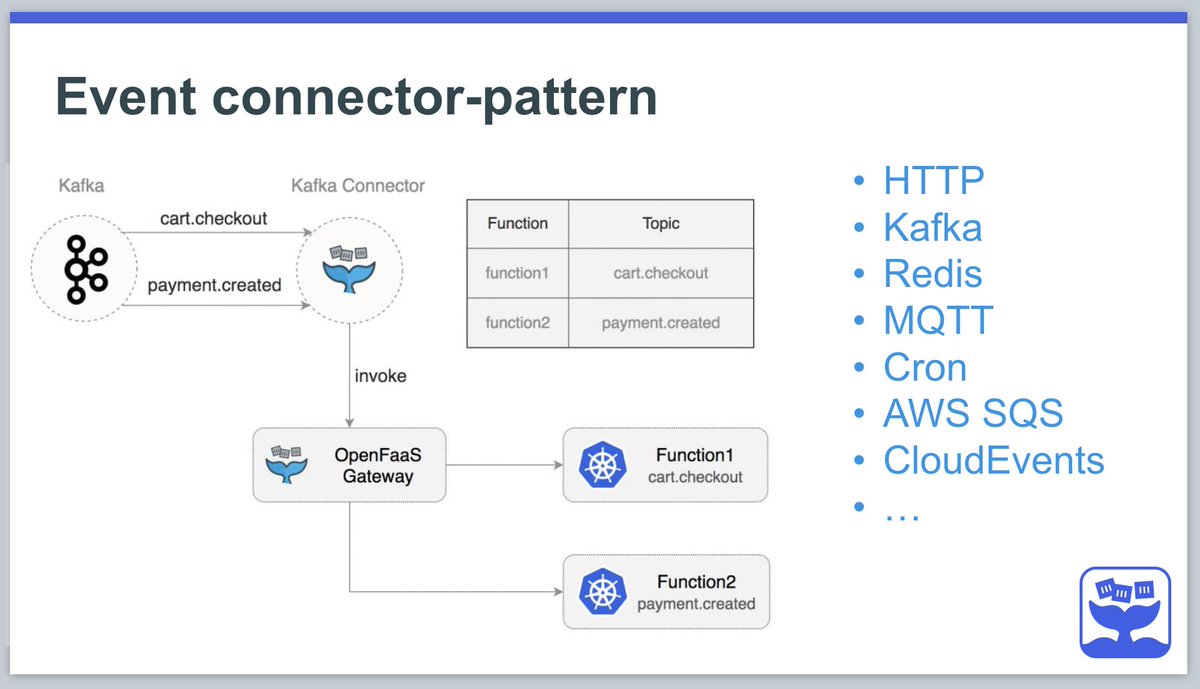https://github.com/openfaas/connector-sdk
SDK for connecting events to functions
https://github.com/openfaas/connector-sdk
ecosystem events openfaas sdk triggers
Last synced: 6 months ago
JSON representation
SDK for connecting events to functions
- Host: GitHub
- URL: https://github.com/openfaas/connector-sdk
- Owner: openfaas
- License: mit
- Created: 2018-11-18T15:35:21.000Z (almost 7 years ago)
- Default Branch: master
- Last Pushed: 2025-01-21T12:29:47.000Z (9 months ago)
- Last Synced: 2025-03-30T07:09:51.189Z (6 months ago)
- Topics: ecosystem, events, openfaas, sdk, triggers
- Language: Go
- Homepage:
- Size: 15.9 MB
- Stars: 53
- Watchers: 4
- Forks: 25
- Open Issues: 14
-
Metadata Files:
- Readme: README.md
- License: LICENSE
Awesome Lists containing this project
README
## connector-sdk
The connector-sdk is a library written in Go that you can use to create event-connectors for OpenFaaS functions.
How it works:
* Create a new CLI application with Go
* Add the code to subscribe to events or messages from your source - i.e. a database, webhooks, message queue
* Add the `github.com/openfaas/connector-sdk/types` package to your code
* Setup a `types.ControllerConfig` with the gateway location
* Run `types.NewController`
* Whenever you receive a message from your source, run `controller.Invoke(topic, data)`
Then whichever functions in your cluster have matching annotation of "topic: topic" will be invoked.
### Conceptual design:

> Each function expresses which topics it can be triggered by, the broker then invokes them using the SDK.
See also: [Triggers in OpenFaaS](https://docs.openfaas.com/reference/triggers/)
## Creating your own connector
See the examples in the [OpenFaaS Docs](https://docs.openfaas.com/reference/triggers/) for inspiration.
You can copy one of them and adapt it, or see the "tester" example in this repo.
The tester example doesn't have an event subscription, but a for loop and sleep combination which simulates receiving an event. You would replace the timer with the callback function from your source such as a HTTP webhook endpoint, a pub-sub SDK or likewise.
Within the event subscriber code, you should call "Invoke()", passing in the topic and message. The functions advertise their "topic".
```go
additionalHeaders := http.Header{}
additionalHeaders.Add("X-Served-By", "cmd/tester")
// Simulate events emitting from queue/pub-sub
for {
log.Printf("Invoking on topic payment - %s\n", gateway)
time.Sleep(2 * time.Second)
data := []byte("test " + time.Now().String())
controller.Invoke("payment", &data, additionalHeaders)
}
```
The results can then be printed using a result receiver.
```go
// ResponseReceiver enables connector to receive results from the
// function invocation
type ResponseReceiver struct {
}
// Response is triggered by the controller when a message is
// received from the function invocation
func (ResponseReceiver) Response(res types.InvokerResponse) {
if res.Error != nil {
log.Printf("tester got error: %s", res.Error.Error())
} else {
log.Printf("tester got result: [%d] %s => %s (%d) bytes", res.Status, res.Topic, res.Function, len(*res.Body))
}
}
```
There are no retry mechanisms at present, but you could use the receiver to requeue failed invocations, or to send on to a dead-letter queue (DLQ).
If you expect many requests in a short period of time, you may want to defer the executions using OpenFaaS' built-in asynchronous queue.
Set the following in `ControllerConfig`:
```go
config := &types.ControllerConfig{
...
AsyncFunctionInvocation: true,
}
```
If you need to use the `Content-Type` header to validate or to check when it invoke the function you can set the `Content-Type`
in `ControllerConfig`:
```go
config := &types.ControllerConfig{
...
ContentType: "application/json",
}
```
View the code: [cmd/tester/main.go](cmd/tester/main.go)
## License
MIT